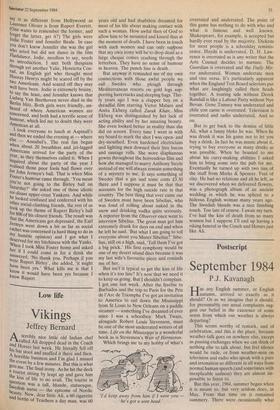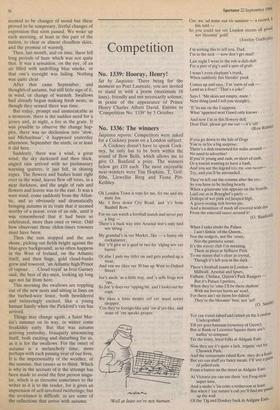Postscript
September 1984
P.J. Kavanagh
Has any English summer, or English autumn, arrived so exactly as it should? Or as we imagine that it should, for presumably our usual complaints sug- gest our belief in the existence of some norm from which our weather is always departing?
This seems worthy of remark, and of celebration, and this is the place, because weather-talk goes on nowhere else, except as passing exchanges when we can think of nothing else to talk about, but feel silence would be rude, or from weather-men on television and radio who speak with a pace and intonation so different in all ways from normal human speech (and sometimes with inexplicable sadness) they are almost im- possible to listen to.
But this year, 1984, summer began when it is meant to, but very seldom does, in May. From that time on it remained summery. There were occasionally what seemed to be changes of mood but these proved to be temporary, fretful changes of expression that soon passed. We woke up each morning, at least in this part of the nation, to clear or almost cloudless skies, and the promise of warmth.
Then, last month, and on time, there fell long periods of haze which was not quite that. It was a sensation, on the eye, of an air filled with undrifting blue smoke, or that one's eyesight was failing. Nothing was quite clear.
After that came September, and thoughts of autumn, but still little sign of it, in wind, or change of warmth. Swallows had already begun making fresh nests, as though they sensed there was time.
But today, prompt and unmistakable as a monsoon, there is the sudden need for a jersey and, at night, a fire in the grate. It was possible to observe the change hap- pen, there was no declension into 'slow, sad Michaelmas', it happened yesterday afternoon, September the ninth, or at least it did here.
Suddenly, there was a wind, a great wind, the sky darkened and then thick, angled rain arrived with no preliminary warning spatters, it just fell, in shining ropes. The flowers and bushes leant right over in the wind, leaves flew off trees, in a near darkness, and the angle of rain and flowers and leaves was to the east. It was a west wind, come suddenly from the Atlan- tic, and so obviously and dramatically bringing autumn in its train that it seemed worthy of a poem, even of an ode, until it was remembered that it had been so celebrated, more than once or twice. Odd how observant those olden-times townees must have been.
Then the rain stopped and the sun shone, picking out fields bright against the blue-grey background, as so often happens in the West of Ireland, on the Atlantic itself; and then huge, gold cloud-banks grew and towered, 'an Atlantic high/Prince of vapour . . . Cloud royal' as Ivor Gurney said, the best of sky-men, looking up long ago not far from here.
This morning the swallows are toppling out of the new nests and sitting in lines on the barbed-wire fence, both bewildered and twitteringly excited, like a young human family when the Pickford's van has arrived.
Things may change again, a Saint Mar- tin's summer on its way, or winter come freakishly early. But that was autumn arriving yesterday, brusquely announcing itself, both exciting and disturbing for us, as it is for the swallows. For the onset of autumn is a melancholy time, more perhaps with each passing year of our lives. It is the impersonality of the weather, of the seasons, that causes us to think. Which is why in the account of it the attempt has been made to avoid the first person singu- lar, which is as tiresome sometimes to the writer as it is to the reader, for it gives an impression of self-involved twitterings; but the avoidance is difficult, as are some of the reflections that arrive with autumn.











































 Previous page
Previous page